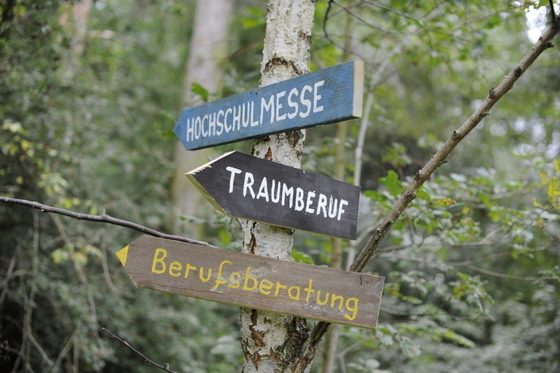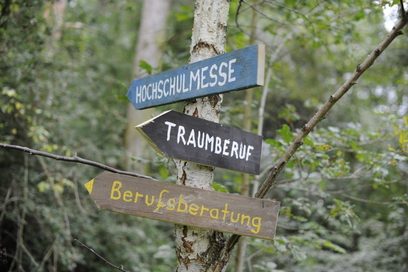Diese Seite ist erreichbar unter:
https://abi.de/unterstuetzung/start-in-germany/making-a-decision
Wir möchten unser Online-Angebot gut auf deine Bedürfnisse anpassen. Zu diesem Zweck setzen wir sogenannte Cookies ein. Entscheide bitte, welche Cookies du zulassen möchtest. Die Arten von Cookies werden nachfolgend beschrieben. Bitte beachte: Je nachdem, welche Cookies du zulässt oder nicht, stehen dir anschließend womöglich nicht mehr alle Funktionen der Website zur Verfügung. Mehr Informationen dazu findest du in unseren Datenschutzhinweisen
Einige unserer Cookies sind technisch bedingt – ohne sie würde unsere Website nicht richtig funktionieren. Sie sind unter anderem erforderlich für die portalweite Suchfunktion, das Anzeigen von Videoinhalten und deine Datenschutzeinstellungen.
Diese Cookies ermöglichen es uns, anonymisierte Daten zu deinem Besuch für Statistiken und die Analyse unserer Website zu sammeln. Wenn du diese Cookies zulässt, hilfst du uns dabei, die Website für die zukünftige Nutzung zu optimieren.
Once you have worked out where your personal strengths and interests lie, you can take the next step and ask yourself: What career path do I want to take? You can then choose between numerous apprenticeships and degree courses.


Firstly, it is important to know how the vocational education system works in Germany. “Here in Germany, we have apprenticeships and degree courses,” explains Dr Paul Stallmeister, careers advisor at Ahlen-Münster federal employment agency. “People from abroad are often familiar with the concept of a degree, but not an apprenticeship – and its level of importance here.”
In principle, the following applies: With an apprenticeship, you learn an occupation, usually over the course of three years, so that you subsequently qualify as a recognised specialist and are paid accordingly in your field. Once you have completed an apprenticeship, you can still complete a course of further training, as a master craftsman or a technician, for example. If you would like to find out more about these possibilities, you can download the brochure “Vocational education and training and continuing education. Overview of vocational qualification opportunities in Germany”.
Having a specific career goal sometimes makes your choice clear. If you want to work as a doctor, for instance, you have to study human medicine. If you want to become a judge, you have to start with a degree in law. It is often the case that it isn’t just one path that leads to your chosen career, however. Would you like to work in the area of care? Then you can study for a degree in care or complete an apprenticeship as a carer – or even combine both in a dual studies course (see Step 1: An apprenticeship or studying for a degree in Germany). The same applies to the IT industry, banking and many other fields.
A variety of degree courses and apprenticeships are also available: In addition to the more theory-based degrees that are offered at universities, universities of applied sciences in particular offer dual courses of study with integrated vocational training or practical periods that are spent at a company. Similar things apply to apprenticeships: While a college-based apprenticeship focuses on theory, a student on a dual apprenticeship works at a company and gains practical experience.
None of these four possible paths is better or worse – but you should find out which ones you can choose from and which one suits you the best. To gain an initial overview, BERUFENET from the Federal Employment Agency (in German) is a good place to start. There, you can learn about areas of work and specific professions and find out which access routes are available, the criteria that need to be fulfilled, and the kind of activities which will await you in your everyday working life.
The offerings from abi.de (in German) also help you to find out about the possibilities. For this purpose, on the homepage, the sections “Welche Ausbildungen gibt es?” (What apprenticeships are there?) and “Welche Studienmöglichkeiten gibt es?” (What study opportunities are there?) are available, where you can find articles on various different topics and fields.
If you are more interested in apprenticeship occupations, it is worth deepening your search. The careers information centres (BiZ) of the Federal Employment Agency have compiled the book “Beruf aktuell”, for example. This not only contains a list of professions according to occupational field, but also more detailed job descriptions. The videos on BERUFE.TV also provide good insights, and include presentations of individual apprenticeship occupations – some with English subtitles. Furthermore, at Planet Beruf you can find articles about young people who discuss their apprenticeships (in German). Their impressions may contain valuable information for your own decision making.
For those interested in studying at a university, studienwahl.de is a good place to start. It contains detailed information about all areas of study and individual courses of study. The linked Studiensuche (course search) feature from the Federal Employment Agency (in German) also allows you to find out the universities in Germany at which you can study a specific subject. The same applies to the Higher Education Compass. On this website, you can search for courses throughout Germany.
Der Artikel enthält ein Video mit weiteren Informationen.
Weitere Filme findest du auf der abi» Videoübersicht.
Stand: 08.05.2025
Vielen Dank für dein Feedback zu dieser Seite! Deine Kritik oder dein Lob zu abi.de kannst du uns gerne auch ergänzend über „Kontakt“ mitteilen. Deine abi» Redaktion
Diese Seite ist erreichbar unter:
https://abi.de/unterstuetzung/start-in-germany/making-a-decision